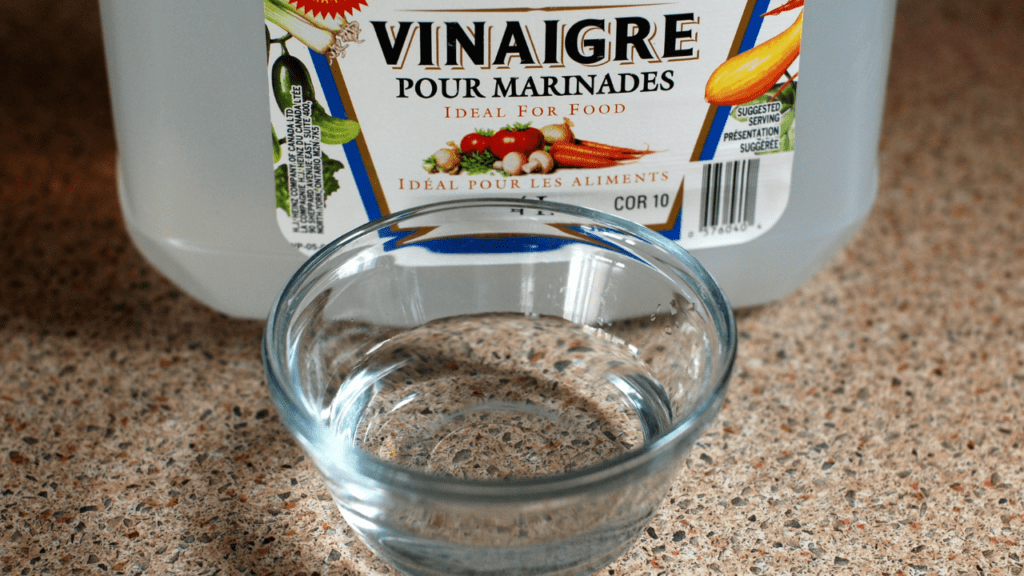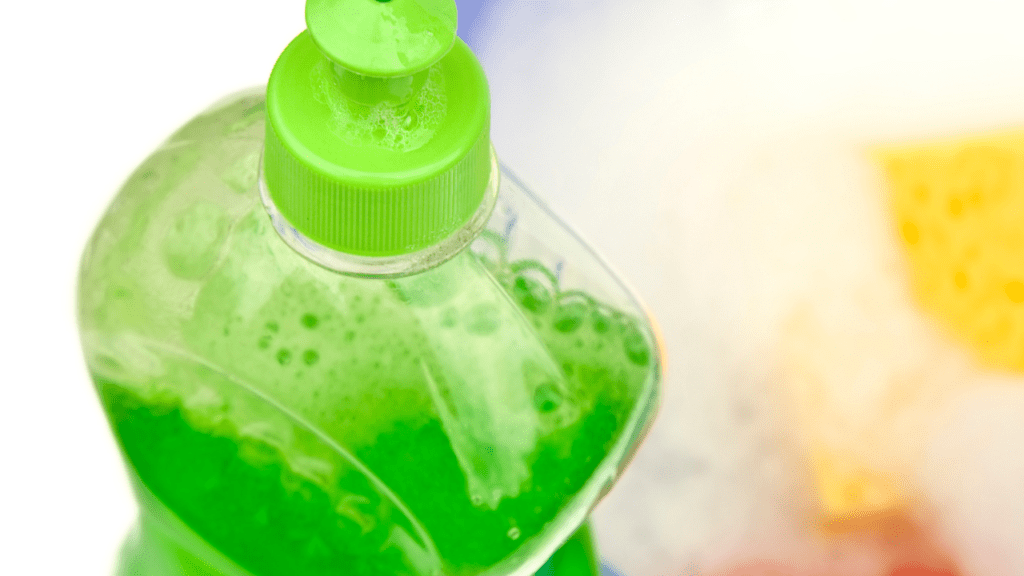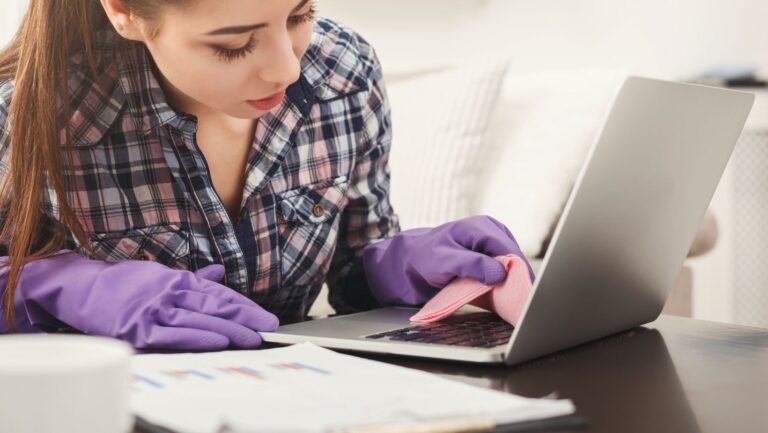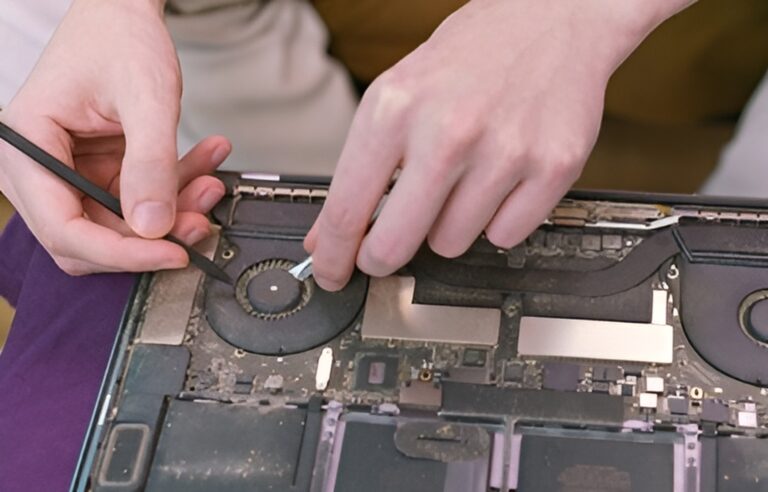Introduction
Importance of cleaning laptop screens
Whether you’re using your laptop at home or in the office, with the passage of time, dust, dirt, fingerprints, and other debris can accumulate on your laptop screen, which can cause reduced visibility, eye strain, and potential damage to the screen. To ensure that you keep your screen clean, it’s important to know how to clean a laptop screen.
Benefits of keeping laptop screens clean
Cleaning your laptop screen regularly helps you maintain an optimal viewing experience and improves your device’s lifespan. Not to mention, a clean laptop screen looks much better than a dirty one! Here are some of the benefits of keeping your laptop screen clean:
- Improved Viewing Quality: A clean laptop screen will offer clearer visuals with brighter colours and sharper images. This can significantly improve your viewing experience, especially if you use your laptop for gaming or watching movies.
- Increased Efficiency: When dirt, dust, and other debris build up on your laptop screen, it can block the light from entering, making the display look dimmer. Keeping the screen clean ensures that light is not blocked, allowing for a brighter and crisper display.
- Prolonged Lifespan: Dust, dirt, and other debris can get into the vents of your laptop and cause your device to overheat, leading to potential damage to its internal components. Keeping your laptop screen clean can help prevent this from happening, thus increasing the lifespan of your device.
- Enhanced Aesthetics: Cleaning your laptop screen regularly will make it look newer and more visually appealing. This can give you a sense of satisfaction knowing that you take good care of your device.
Cleaning your laptop screen can have many benefits and should be done regularly. With a few simple steps, you can keep your laptop looking and running at its best.
Types of Laptop Screens
If you are wondering if all laptop screens are the same then you are wrong. There are two types of laptop screens and each one requires a different method for cleaning. The first type is a glass-covered LCD and the second one is a non-glass-covered LCD. When it comes to cleaning your laptop screen, the most important factor is to understand the type of screen you have.
Glass Coated Laptop Screens
Glass-coated laptop screens are the most common type of laptop screen and are found on many laptops. These screens are constructed with a thin layer of glass that provides an extra layer of protection for the LCD underneath. The glass layer also provides an anti-glare effect which helps reduce eye strain while using the laptop. These screens have a protective glass coating that makes them less susceptible to scratches and damage from cleaning.
Non-Glass Coated Laptop Screens
Non-glass coated laptop screens are typically found on older models and are made from a plastic or resin material. These screens are usually less expensive to produce but lack the scratch resistance that glass-coated laptop screens offer. Additionally, non-glass-coated laptop screens don’t provide the anti-glare effect, making them more susceptible to glare from direct light sources such as a window or overhead light. These screens are more prone to scratches and damage from cleaning.
How to Identify Your Laptop Screen Type
Identifying your laptop screen type is essential for properly cleaning it. It’s important to know whether your laptop has a glass-coated or non-glass-coated display. If you’re unsure of which type of screen your laptop has, there are several ways to identify it.
The easiest way to check is by looking at the screen itself. Glass-coated displays will have a glossy finish and may be reflective. Non-glass-coated displays will be more matte in appearance and won’t have any reflectivity. You can also check the user manual that came with your laptop, or look up the make and model online to see what type of display you have.
Additionally, if your laptop has been in service for some time, the manufacturer may have included instructions for cleaning either a glass-coated or non-glass-coated display. This can be helpful when trying to determine the type of screen on your device.
Finally, some laptop screens come with a protective film already applied. This protective film can help reduce glare and fingerprints on the screen, and it will also protect against scratches. If your laptop screen has a protective film, it’s likely a glass-coated display. Knowing what type of laptop screen you have is important for determining the proper way to clean it. Be sure to properly identify your laptop’s display before attempting any cleaning methods.
Cleaning Glass Coated Laptop Screens
USEFUL TIPS
- Give support to your screen by putting your hand behind it so that cleaning becomes easy and smooth.
- Avoid using too much liquid and ensure the microfiber cloth is not too wet to clean the laptop screen without streaks
PRECAUTIONS BEFORE CLEANING
- Avoid the use of excessive moisture to prevent damage to your laptop’s screen.
- Don’t use harsh cleaning chemicals that are not designed for a laptop screen.
- Never spray any cleaner, mixture, or chemical directly on the screen.
- Don’t use rough cloth or tissue as it will leave fibers on your screen and make it difficult to clean. (Always use microfiber or lint-free soft cloth).
When it comes to cleaning your laptop screen, you may be surprised to find out that you don’t need any specialized materials or equipment to do the job. You can easily clean your laptops with these things that are more frequently used in your home. Even so, you’ll need to follow some simple steps to properly clean your laptop screen.
Required materials
- Distilled water
- Isopropyl alcohol or vinegar( If you don’t have isopropyl alcohol or vinegar at home, you can use Liquid Soap Solution. See FAQ for more details on this)
- Lint-free cloth (Microfiber cloth will be most suitable). If you can’t seem to find lint-free cloth you can use a cloth that comes with your glasses because it is also a microfiber cloth.
1. Turn Off and Unplug the laptop
Okay, so you have got everything ready but before cleaning your laptop screen, make sure you unplug it. An unexpected shock or power surge could damage your screen, so you must disconnect all your devices before cleaning.
Once you have done that, turn off your laptop and disconnect any external accessories such as the mouse and keyboard. If your laptop comes with a removable battery, you should remove your battery too—just to be safe. Remember Safety first!
2. Wipe off the Dirt
The first step is to use a dry microfiber cloth to wipe away the dirt as much as possible. Microfiber cloths are specially made to never scratch surfaces like electronics. If the screen has too much dust then you can use more than one cloth to remove the dust from your screen.
3. Preparing Mixture for Cleaning



To prepare the mixture for cleaning make sure to mix equal parts distilled water and isopropyl alcohol or vinegar in a spray bottle. For Example, if you fill half a bottle with distilled water then you have to fill the remaining half bottle with alcohol or if you fill one-fourth of the bottle with distilled water then you have to fill one-fourth with isopropyl alcohol so that you have half bottle of the mixture.
4. Cleaning the Screen
Place a soft cloth over your finger and dip it in alcohol or spray alcohol on the cloth. Using small, circular motions, wipe off any dirt or grime on your laptop screen. Be sure not to press too hard! The idea is just to wipe gently.
It’s important not to use too much pressure when cleaning laptop screens, otherwise, you could damage them in some way that renders them useless. Make sure you don’t skip any areas, especially around corners. This part of your cleaning laptop screen will ensure you didn’t miss any dust particles!
5. Let it Dry
Use a dry microfiber cloth to wipe away any remaining moisture, but it’s important not to touch it too much. The oils from your skin will end up on your display, which can cause image distortions. Leave it alone and let the air dry it naturally. It might take minutes, but there’s no need for you to do anything else. You can also switch on your room’s fan and let your laptop dry quickly.
Cleaning Non-Glass Coated Laptop Screens
Required materials
- Distilled water
- Microfiber cloth (If you can’t seem to find lint-free cloth you can use a cloth that comes with your glasses because it is also a microfiber cloth)
Steps to follow for cleaning
Non-glass-coated laptop screens are usually made of plastic or rubber and can be more difficult to clean than glass-coated ones. Here is a step-by-step guide to help you safely clean your non-glass-coated laptop screen:
- Make sure the laptop is powered off and unplugged.
- Take a soft, dry cloth and use it to gently wipe away any dust or dirt that has accumulated on the surface of the laptop screen.
- If there are stubborn spots that won’t come off with just a dry cloth, dampen a second soft cloth with water and carefully wipe the spots away. Avoid using too much water as this could damage the laptop’s components.
- If the stains are still present, add a few drops of dish soap to the dampened cloth and try to remove them again. Dish soap is mild enough that it won’t harm the laptop screen but strong enough to break down any residue.
- After wiping down the laptop screen with the soapy cloth, use a third dry cloth to wipe away any remaining soap or water from the screen.
- Allow the laptop to air dry for at least 10 minutes before powering it back on.
By following these steps, you should be able to easily and safely clean your non-glass-coated laptop screen. Make sure you never use alcohol or vinegar on your laptop screen, as these can damage the coating and cause permanent damage.
Frequently Asked Questions (FAQs)
Q. What If I Don’t Have Isopropyl Alcohol or Vinegar At Home For Cleaning Laptop Screens?


A. If you don’t have isopropyl alcohol or vinegar at your home you can use dish wash liquid to clean your laptop screen. Follow the below steps for cleaning:
- Mix a couple of drops of dish wash liquid and a couple of cups of warm water and stir it up to prepare a solution.
- Dampen a microfiber cloth with the solution until it’s slightly damp but not soaking wet.
- Gently wipe the cloth over the screen in circular motions.
- Use a dry microfiber cloth to wipe away any remaining moisture.
Q. Can I use alcohol wipes to clean my laptop screen?
A. It’s not recommended as alcohol wipes can contain harsh chemicals that can damage the screen’s coating.
Q. Can I use glass cleaner on my laptop screen?
A. No, glass cleaners are not designed for use on laptop screens and can contain chemicals that may damage the screen’s coating.
Q. Is it okay to clean a laptop screen with water?
A. Yes, as long as you use distilled water and a soft microfiber cloth. Avoid using tap water as it can contain minerals that may leave streaks or damage the screen.
Q. Can I Use Windex To Clean My Laptop Screen?
A. Yes, you can use Windex to clean your laptop screen. Steps to follow for cleaning:
- Spray Windex onto a microfiber cloth until it’s slightly damp.
- Gently wipe the cloth over the screen in circular motions.
- Use a dry microfiber cloth to wipe away any remaining moisture.
Q. Can I use wet wipes to clean a laptop screen?
A. It’s best to avoid using wet wipes as they can contain chemicals that may damage the screen.
Q. Can I use Clorox wipes to clean a laptop screen?
A. No, Clorox wipes contain harsh chemicals that can damage the screen’s coating.
Tips for Maintaining a Clean Laptop Screen
Regular cleaning schedule
It’s important to establish a regular cleaning schedule to keep your laptop screen free from dust, dirt, and fingerprints. A weekly cleaning routine is recommended, although this may need to be adjusted depending on your usage and environment. Regular cleaning will help to prevent the buildup of dirt and grime, which can be more difficult to remove over time.
Proper storage and handling of laptops
In addition to regular cleaning, proper storage and handling of your laptop can help to keep the screen clean. When not in use, store your laptop in a protective case or sleeve to prevent dust and debris from settling on the screen. Avoid placing your laptop on dirty or dusty surfaces, and use a clean, flat surface to work on.
Avoiding the use of harsh chemicals
Using harsh chemicals, such as bleach or ammonia-based cleaners, can damage the coating on your laptop screen and make it more prone to scratches and other damage. Instead, opt for gentle cleaning solutions, such as water and vinegar or a dedicated screen cleaning solution. When using any cleaning solution, apply it to a soft, lint-free cloth and avoid spraying it directly onto the screen.
By following these tips for maintaining a clean laptop screen, you can help to extend the life of your device and ensure that it remains in good working condition for years to come.
Conclusion
Keeping your laptop screen clean is essential for maintaining the appearance of your device and preventing unnecessary damage. Knowing the type of screen you have and how to properly clean it is an important step in prolonging the life of your laptop.
Whether you choose to use a specialized cleaner or opt for a homemade solution, be sure to follow the instructions provided in this guide for the best results. Always remember to exercise caution when cleaning any delicate electronic equipment, as improper cleaning can cause more harm than good. With these tips, you can now keep your laptop looking like new.
What to do Next!
After completing this guide on “How to Clean a Laptop Screen”, don’t forget to keep your laptop Keyboard clean too. Check out our guide on “How to Clean a Laptop Keyboard”.


